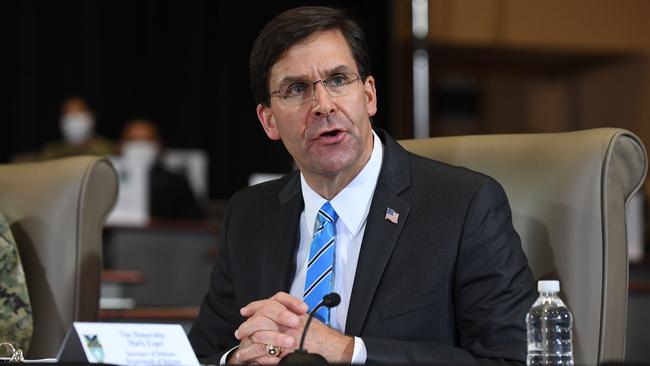US orders China consulate closed, bolsters forces in Indo-Pacific
The US has ordered China to close its consulate in Houston within 72 hours and accused it of ramping up spying operations.

The US has ordered China to close its consulate in Houston within 72 hours and accused it of ramping up spying operations, dramatically escalating tensions between the superpowers.
The announcement infuriated Beijing, which vowed to retaliate.
The decision was taken in order “to protect American intellectual property and Americans’ private information”, a US official said. The State Department said China had engaged in massive spying and influence operations throughout the US for years. “These activities have increased markedly in scale and scope over the past few years,” it said.
Before the news emerged, firefighters were called to the consulate in Texas following reports that documents were being burned in the courtyard. In Beijing, foreign ministry spokesman Wang Wenbin said the order to close the consulate was an “outrageous and unjustified move”.
Earlier two of the most senior Trump administration figures warned that the US was preparing its military forces across the Indo-Pacific region for potential confrontation with China while working to build a global coalition against Beijing aggression.
Defence Secretary Mark Esper told the London-based International Institute for Strategic Studies late on Tuesday that the US military was modernising its “strength deterrence” across Asia and prioritising the deployment of forces and technologies to counter Chinese efforts to “undermine” a free and open region.
But he warned the US could not do it alone and that “if we are not careful we will find ourselves in a situation where … we have a completely different regional order that puts China at the top and is based on Chinese values, and I don’t think those are things that any of us want to see happen in the long run”.
Mr Esper said the coronavirus pandemic had reinforced the “necessity of a rules-based international order rooted in transparency, openness, honesty” yet the Chinese Communist Party (CCP) “continues to engage in systematic rule-breaking, coercion and other malign activities”. “Most concerning to me is that the PLA continues its aggressive behaviour in the eastern South China Sea, including sinking a Vietnamese fishing boat, harassing Malaysian oil and gas development, escorting Chinese fishing fleets into Indonesia’s claimed Exclusive Economic Zone and militarising occupied features in direct contravention to China’s commitments under international law,” he said.
“In doing so the CCP has bullied ASEAN nations out of an established $US2.6 trillion in potential offshore oil and gas revenue, not to mention access to fishing grounds that millions of people depend on for their livelihoods.”
In London, US Secretary of State Mike Pompeo also accused Beijing of exploiting the pandemic to further its interests and urged allies and partners to join the US in countering the threat posed by an increasingly muscular Beijing.
“We hope we can build out a coalition that understands the threat and will work collectively to convince the Chinese Communist Party that it is not in their best interest to engage in this kind of behaviour,” Mr Pompeo told reporters with British Foreign Secretary Dominic Raab.
“We want to see every nation who understands freedom and democracy … to understand this threat that the Chinese Communist Party is posing to them.” The comments, days after the US declared Beijing’s claims in the South China Sea unlawful, appear part of a deliberate strategy to match China’s so-called Wolf Warrior diplomacy, with US diplomats across Asia also making a series of outspoken statements in recent days accusing Beijing of encroaching on others’ sovereignty.
The US deputy chief of mission to Yangon, George Sibley, warned in a Saturday opinion piece that Myanmar should take note of Beijing’s new security law in Hong Kong and its actions in the South China Sea because that was “how modern sovereignty is often lost: not through dramatic, overt action, but a cascade of smaller ones that lead to its slow erosion over time”.
The US ambassador to Manila, Sung Kim, wrote a similarly critical piece for CNN Philippines, saying the US rejected all China’s “maritime claims within the Philippines Exclusive Economic Zone” its continental shelf and in waters surrounding the Spratleys island chain that Beijing claims is part of its historical territory.
Mr Esper said the US was not looking for conflict and he hoped to visit China before the end of the year.
However, he stressed the US would continue to sell arms to Taiwan, deploy navy ships into the region to exercise its freedom-of-navigation rights as it had done a record number of times last year.
Additional reporting: AFP




To join the conversation, please log in. Don't have an account? Register
Join the conversation, you are commenting as Logout